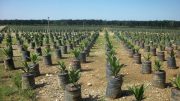When Indonesia’s former president Susilo Bambang Yudhoyono declared a moratorium in May 2012 on the issuance of new permits for logging in primary forests and on peat lands, it was widely hailed as an important, albeit far too limited, step in clamping down on the country’s levels of deforestation.
A big question at the time was just what impact the moratorium would have on the forestry sector and how much it would move Indonesia toward its target of reducing greenhouse gas emission by 26 – 41 percent from a projected 2020 baseline.
Now, in a first of its kind study, a group of researchers has estimated the impact of that moratorium on rates of deforestation and the amount of greenhouse gases emitted into the atmosphere because of the felling of Indonesia’s forests and the degradation of its carbon-rich soils.
“The current moratorium policy has probably had a modest effect on reducing emissions below what they would have been otherwise,” Jonah Busch, a research fellow at the Center for Global Development and lead author on the report, told Mongabay.com. “But if Indonesia is to meet its climate targets, a much stronger policy response is needed.”

Global Forest Watch map showing forest loss between 2001-2012 as well as primary and secondary forest in Indonesia. According to a study published last June, Indonesia lost more than 6 million hectares of natural forest between 2000 and 2012.
The study, published on Monday in the Proceedings of the National Academy of Sciences, is a “what if” analysis, estimating how much less deforestation would have occurred on parcels of land between 2000 and 2010 if new logging permits were not issued for oil palm, timber, and logging projects. Busch and his team estimated overall emissions would have fallen by as much as 7.2 percent, or as little 2.5 percent.
“Indonesia’s rates of deforestation continued to climb after the moratorium was introduced but they probably would have been even higher without the moratorium,” said Busch, “It’s probably not reasonable to expect that the moratorium policy on its own could reduce emissions by much — the moratorium was always limited in its scope to reduce emissions due to its limited coverage.”
Emissions from newly licensed concessions from 2000 to 2010 accounted for only 15 percent of Indonesia’s total emissions from deforestation. In other words: Eighty-five percent of deforestation-related emissions were never going to be covered by the moratorium. So, because of its design, the moratorium was “insufficient” in achieving Indonesia’s carbon emissions reduction target, says the study.
The team estimates that 11.45 million hectares of forest were destroyed in Indonesia from 2000 to 2010, releasing the equivalent of 8.59 gigatons of carbon dioxide. That’s about the total annual emissions from nearly two billion automobiles.
Twenty-one percent of emissions from deforestation come from forest destruction and land degradation on existing concessions and nearly 60 percent occur outside of concessions, neither of which was covered by the 2012 moratorium.
Busch’s team found that had the moratorium been in place during the first decade of the new millennium, deforestation on oil palm concessions would have dropped anywhere from 15 – 65 percent, on concessions designated for pulp and paper production by 31 – 56 percent, and on logging concessions 3 – 10 percent.
The wide range of possible impacts on deforestation rates is accounted for by the fact that each type of forest activity entails either wholesale land clearing or a more selective cutting down of trees within a concession.
“Logging concessions sanction selective exploitation of valuable tree species within forests. So the effect of logging concessions on forest cover is considerably lower overall,” said Busch. “There’s been a debate on whether logging concessions are good for the forest. We don’t find that they are good relative to non-concession land, but we certainly find that they are much less bad than oil palm or timber concessions.”
Busch said that one of the surprising findings to emerge from the group’s research was the high rate of deforestation from timber, that is, concessions that produce trees for the pulp and paper industry. The group did not distinguish between natural forests and plantations when looking at forest loss between 2000 and 2010.
“Our research does suggest that while the focus on the palm oil industry as a driver of deforestation in Indonesia is justified, there should be a greater focus on the pulp and paper industry as a driver of deforestation in Indonesia as well,” said Busch.
Indeed, because of the pace that permits for timber plantations were issued between 2000 and 2010, reductions in emissions from the pulp and paper sector would have accounted for 58 – 74 percent of overall emission reductions.
As an alternative to the moratorium, the researchers found that a carbon-pricing mechanism, either a cap-and-trade or tax-and-subsidy system, could achieve equivalent results with a price per ton of carbon set at $3.30 – $7.50 per ton under a mandatory program or $12.95 – $19.45 per ton if done voluntarily.
In addition to Busch, scientists from Duke University, Conservation International, World Resources Institute, the University of Maryland, and Woods Hole Research Center participated in the analysis.
“It’d be nice to eventually do a retrospective analysis of the impact of the actual post-2011 moratorium,” said Busch. “But this is more challenging because we don’t know where concessions would have been designated post-2011 without the moratorium, while we do know which pre-2010 concessions would not have been there if there’d been a moratorium.”
Robert S. Eshelman
Originally published by Mongabay.com
20 January 2015






Be the first to comment on "Indonesia’s moratorium not enough to achieve emissions reduction target"